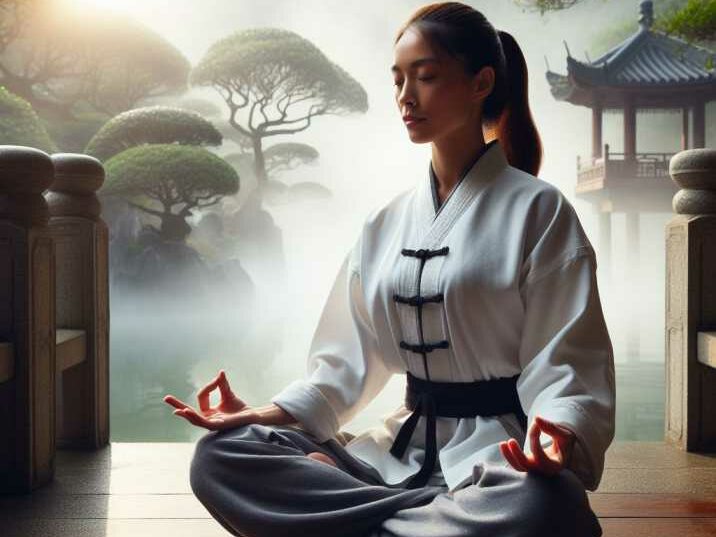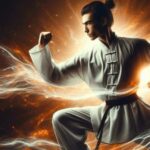Introduction
Table of Contents
In the realm of martial arts, Kung Fu stands as a symbol of discipline, strength, and agility. Beyond its physical prowess, many practitioners and enthusiasts alike wonder: Can Kung Fu be used for spiritual development? This article delves into the profound connection between Kung Fu and spiritual growth, exploring the philosophical underpinnings and transformative potential of this ancient martial art.
The Essence of Kung Fu
The Way of the Warrior: Navigating Physical and Spiritual Realms
Kung Fu, also known as Gong Fu, transcends mere combat techniques; it embodies a holistic philosophy rooted in harmony, balance, and self-cultivation. At its core, Kung Fu emphasizes the cultivation of both mind and body, fostering a deep connection between physical prowess and spiritual enlightenment.
The Philosophy of Kung Fu
Central to the practice of Kung Fu is the Taoist principle of Wu Wei, or “effortless action.” This concept emphasizes naturalness, spontaneity, and non-interference, aligning with the idea of surrendering to the flow of life. Through diligent training and disciplined practice, Kung Fu practitioners seek to embody Wu Wei, transcending ego-driven desires and attaining a state of inner peace.
The Spiritual Dimensions of Kung Fu
The Journey Inward: Kung Fu as a Path to Self-Realization
Kung Fu serves as a vehicle for spiritual development by fostering self-awareness, resilience, and inner strength. As practitioners engage in rigorous physical training and meditation, they confront their limitations, fears, and insecurities, paving the way for profound personal growth.

Mindfulness in Motion
In the practice of Kung Fu, every movement is infused with mindfulness. Whether executing a punch, kick, or block, practitioners cultivate a heightened awareness of their body, breath, and surroundings. This mindfulness in motion not only enhances combat effectiveness but also facilitates a deeper connection to the present moment, fostering inner calm and clarity.
The Integration of Body, Mind, and Spirit
Harmony in Motion: Achieving Oneness through Physical Mastery
Kung Fu emphasizes the integration of body, mind, and spirit, viewing them as interconnected aspects of one’s being. Through rigorous physical training, practitioners develop strength, flexibility, and coordination, cultivating a harmonious relationship between their physical form and inner essence.
The Power of Breath
Breath plays a pivotal role in Kung Fu practice, serving as a bridge between the physical and spiritual realms. By synchronizing breath with movement, practitioners harness the power of Qi, or life force energy, facilitating the free flow of energy throughout the body. This conscious breathing not only enhances physical performance but also promotes mental clarity and emotional balance.
The Role of Discipline and Commitment
Forging the Warrior Within: The Path of Discipline and Commitment
Kung Fu demands unwavering discipline and commitment from its practitioners. Through countless hours of dedicated practice and relentless perseverance, individuals embark on a transformative journey of self-discovery and personal evolution.
Embracing the Martial Way
In Kung Fu, discipline extends beyond the physical realm; it encompasses mental fortitude and emotional resilience. By adhering to a strict code of conduct and embracing the martial virtues of integrity, humility, and respect, practitioners cultivate a strong foundation for spiritual growth and ethical living.

Table of Information Can Kung Fu be used for spiritual development?
| Aspect | Description |
|---|---|
| Philosophy of Kung Fu | Wu Wei principle, Taoist philosophy |
| Spiritual Dimensions | Mindfulness in motion, resilience, inner strength |
| Integration of Body, Mind, | Harmony between physical form and inner essence, power of breath |
| Role of Discipline | Commitment, mental fortitude, adherence to martial virtues |
Conclusion
Can Kung Fu be used for spiritual development? Kung Fu is not merely a martial art; it is a profound path of self-discovery, inner harmony, and spiritual development. By embracing its timeless teachings and embodying its guiding principles, practitioners can unlock the transformative power of Kung Fu, leading to a deeper understanding of oneself and the world.
Frequently asked questions (FAQs)
FAQ 1: Is Kung Fu primarily focused on physical combat, or does it have spiritual aspects as well? Answer: While Kung Fu is often associated with martial combat techniques, it encompasses a rich philosophical tradition deeply rooted in spirituality. The practice of Kung Fu emphasizes the cultivation of inner harmony, self-awareness, and spiritual growth alongside physical prowess.
FAQ 2: How does Kung Fu contribute to spiritual development compared to other martial arts? Answer: Kung Fu stands out among martial arts for its holistic approach to spiritual development. Through rigorous physical training, meditation, and adherence to ethical principles, Kung Fu practitioners strive to integrate body, mind, and spirit, fostering a deeper understanding of themselves and the universe.
FAQ 3: Can anyone practice Kung Fu for spiritual development, or is it reserved for martial arts experts?Answer: Kung Fu is accessible to individuals of all ages and skill levels, regardless of previous martial arts experience. While mastering advanced techniques may require dedicated training and discipline, the principles of Kung Fu can be applied by anyone seeking personal growth and spiritual fulfillment.
FAQ 4: How does mindfulness play a role in Kung Fu practice, and how does it contribute to spiritual development? Answer: Mindfulness is central to Kung Fu practice, as it cultivates a heightened awareness of the present moment. By integrating mindfulness into martial arts movements, practitioners develop greater focus, clarity, and emotional resilience, facilitating spiritual growth and self-discovery.
FAQ 5: Can Kung Fu practice be adapted to align with different spiritual or philosophical beliefs? Answer: Yes, Kung Fu is a versatile discipline that can be adapted to resonate with various spiritual and philosophical traditions. While rooted in ancient Chinese philosophy, practitioners from diverse backgrounds incorporate their own beliefs and values into their Kung Fu practice, making it a truly universal path of spiritual development.


